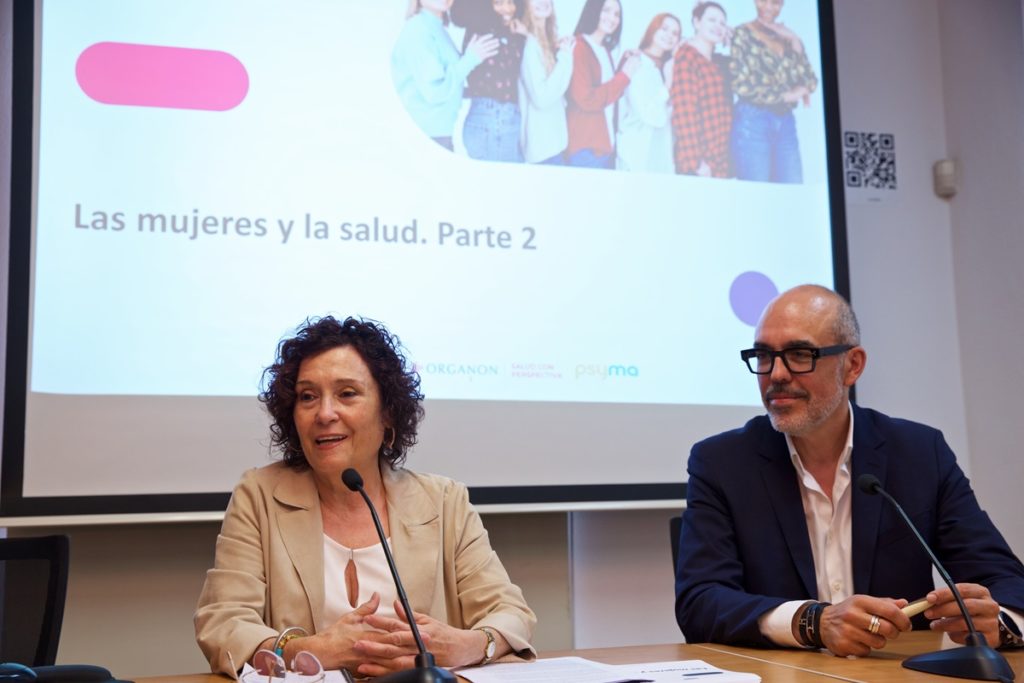
Half of the participants in the survey “Health and women”, directed by the professor of Preventive Medicine and Public Health of the University of Alicante, María Teresa Ruiz Cantero, He states that he usually waits to have serious symptoms to go to the doctor, despite the negative consequences it may have for your health.
María Teresa Ruiz Cantero presented the results of this report to the media this Wednesday, together with the Executive Director of Institutional Relations, Access and Communication of Organon, Manuel Anxo Blanco. The presentation to society and the scientific community will be held this afternoon, at 7:00 p.m. University Headquarters City of Alicante, in the building at 40 San Fernando Street.
The person responsible for the study has stated that the “Women and Health” survey, “collects the voices of 1,504 women from Spain about their current status, main causes and experience with the most frequently suffered health problems, and with menstruation and its absence. Also about the frequency of demand for health care, and the support of their families; as well as their perceptions about what the health system does for them to make them better, their satisfaction with it, and their knowledge of the best possible health professional practices.”
Made by Psyma Ibérica, commissioned by Organon and with the support of the University of Alicantebetween June and July 2022, to women between 18 and 75 years old and residents of Spain, The first part focused on the possibilities of conciliation and its relationship with healthy lifestyle habits. of the women surveyed, and was already presented in March 2023.
Now, In this second report, As Ruiz Cantero explained, “the most outstanding results regarding the health condition of the participants, the way in which women do health care usethe time it takes to request it and the impact on the quality of life of their illnesses, menstruation and menopause.”
During the presentation, María Teresa Ruiz Cantero highlighted “the commitment to equality at the University of Alicanteboth in university policies and in the academic field, as well as for research, knowledge transfer and talent.”
Dr. Manuel Anxo Blanco has agreed to highlight the importance of collaboration between the business and academic spheres and has explained that “At Organon we want to promote health with perspective, a new look at women’s comprehensive health, sensitive to their differences, seeking equality and awareness. Together with the University of Alicante and Professor María Teresa Ruiz Cantero, we carried out this survey to better understand the social determinants that influence their health, with women themselves explaining their circumstances and experiences with health or illness. We believe that the results of this survey are a call to action to improve women’s health, since by improving it, we will improve the health of society in general.”
Almost 7 in 10 women believe that their condition is good or very good while less than one in 10 believe that it is bad or very bad
The UA professor has indicated that the starting point to better understand women’s health “is to know what their self-perception is.” So, For 68% of those surveyed, the perception of their own health status in the last year is good or very good and only bad or very bad for 6%. of those surveyed. This data is independent of having or not having a disease, since 57% of the women surveyed affirm that they are not sick or have a health problem; 35% say they have a diagnosis for their health problem and the remaining 8% say they are waiting for a definitive diagnosis.
Regarding the habits of use of health centers, he explained that 76% of all women surveyed say they go alone to receive health care, a figure that is even higher among women aged 36 to 50, a range in which it reaches 82% and among those aged 51 to 65 it rises to 83%. Even 69% of women aged 66 to 75 still seek medical care alone. For the author of the study “this is striking because normally women accompany men and women accompany women but in general women are rarely accompanied to health care.”
Along these lines, he has pointed out that The frequency with which they go to the doctor is once a year for 58% of women and 33% go when they need it. Besides, almost half of the women surveyed undergo medical check-ups and examinations, that is, they take safety measures prevention secondary.
Regarding the type of health center they go to, more than 80% of the women surveyed go to a primary care center facing a health problem. Of all the participants in the survey, 32% say they have private insurance, however, 66% of this group of women say they go, exclusively or in combination, to the public sphere.
Another surprising conclusion refers to daily habits with effects on health and well-being. “Something that has caught our attention about the context is that Women who reconcile, regardless of socioeconomic level, do more preventive activities, more leisure, sports, sleep and self-care activities than those that do not reconcile and this is something that is worth highlighting because it does not depend so much on the socioeconomic level, but rather depends on a commitment to greater conciliation.”

More common diseases
Regardless of whether or not there is a definitive diagnosis, Ruiz Cantero has specified that “the main areas in which the women surveyed say they have an illness or health problem are allergies, mental health, diabetes, high blood pressure, obesity and hypercholesterolemia, neurological diseases and those related to the female reproductive system”. Eating disorders and gastrointestinal diseases are also mentioned.
In relation to these diseases, the researcher from the University of Alicante has highlighted thatThe time it took to seek assistance when the first symptoms appeared was more than a year in between 20 and 30%. of the cases.
The professor has offered the data related to the diseases that have the greatest impact on the quality of life of women, according to survey responses. Thus, the depression is the health problem with the greatest impact on the quality of life of those surveyed, with an 8.2 out of 10. It is followed by the impact of migraine, 7.5 out of 10; the allergies, with a 6.46 out of 10; and the set of diseases diabetes, hypertension, obesity and hypercholesterolemiawhose impact on quality of life according to what they reported is 5.93 out of 10.
On the other hand, in addition to common diseases, women can also have pathologies or gynecological problems. In the case of the women surveyed who say they have some morbidity related to the female reproductive system, their quality of life is affected by 7.82 out of 10. And as for the women who in the survey reported having health problems related with the menopausetheir quality of life is affected by 7.47 out of 10. It is noteworthy that, in both cases, more than 36% stated that it took more than a year to seek health care after the first symptoms.
silently
The researcher has commented that the impact on the daily life of the menstruation and menopause is often silently accepted by women, although when asking the respondents about the symptoms, their importance can be observed.
Thus, 52% of the total number of women surveyed claim to have menstruation and indicate, with different percentages, symptoms such as tiredness, mood swings, heavy bleeding and painful periods. 36% usually take pain medication, although only 17% go to the doctor due to menstrual pain. In this regard, María Teresa Ruiz maintains that “it is not wrong to normalize what is normal, the physiology of women is like that, but it is also true that we do not have to endure infinity” and encourages us to “check the doubts that we as patients have with professionals” before the possibility of starting treatments.
For their part, of the total number of women surveyed, 43% claim to have had no menstruation for more than a year. Women in this group mention the following symptoms as the most common: hot flashes and night sweats; changes in your physical appearance (weight gain, more body hair); worsening sleep quality and sexual loss. Only 12% say they feel sadness for having left the fertile stage behind.
Experience of illness and health care
Finally, the UA professor recalled that both the Gendered Innovations project at Stanford University and the First Women’s Health Strategy of the United Kingdom identify gender challenges in health care for women in order to contribute to your best health.
In this sense, the women surveyed also assessed some questions that scientific literature usually asks about, and that can explain women’s behaviors when faced with diseases, the doctor-patient relationship and the assessment of satisfaction with it.
Thus, 67.7% of those surveyed think that women and men react differently to the same symptoms or illness. 49.7% of the women surveyed affirm that they usually wait until they have serious symptoms to go to the doctor. 57% (56.9% exactly) of those surveyed think that, faced with the same illness or health problem, they are not heard and they are not given the same effort for diagnosis and treatment as men; and 46.6% of those surveyed say disagree with the statement that doctors are interested in their social and family contextwhile only 14.3% believe that they are interested in their social and family context.
Ruiz urges to promote and intensify preventive health education to reduce the number of those almost half of women who wait to show serious symptoms before going to the consultation. Additionally, to this decision of the patients, between 20 to 30% depending on the pathology suffer an average wait of three months to be seen, after which three out of 10 women also obtain a diagnosis after a year.
On the path of these women until they achieve a diagnosis, “as they go to different doctors, sometimes each doctor gives them a diagnosis that is not the right one until the time comes when it is right.” With all this process, appropriate treatments and therapies are also delayed.
As the professor has stated, “the perspective of the social determinants of health considered in this Women’s Health Survey provides new knowledge about the sociocultural, family, economic and gender dimensions; as well as the dimension related to how the health structure understands and addresses the needs of women. This information can be useful for approaching strategies with a focus on the comprehensive health of women and, therefore, the health of the society to which they contribute so much.”

